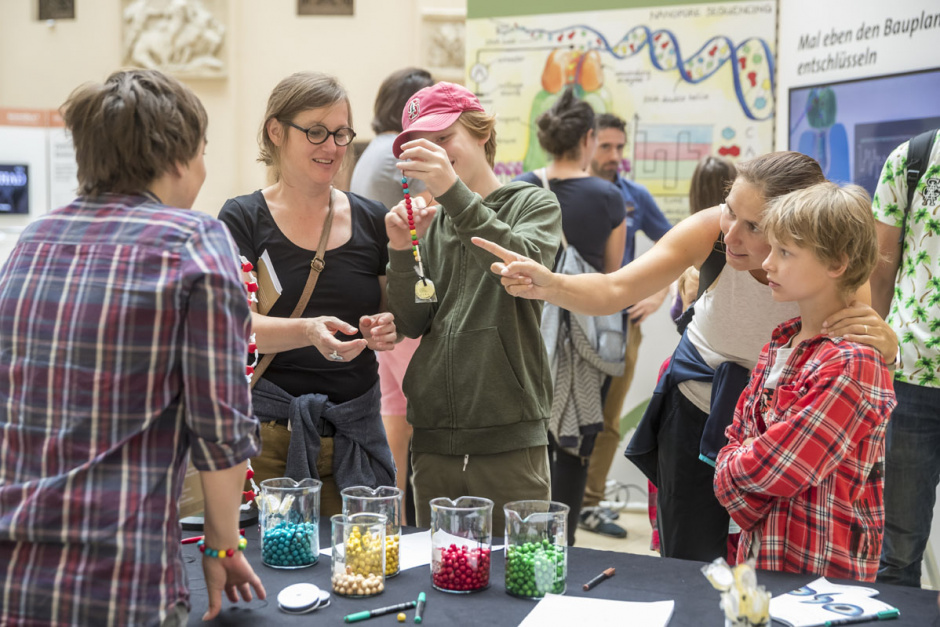Formats

What formats are available, and what are they suitable for?
You can take part in Scientifica with a wide range of contributions. See below for an overview of the possible formats.
Exhibition booth
Researchers present their work to visitors in individual conversations, and answer their questions. Hands-on exhibits, installations or short demonstrations can all serve as a starting point for discussions about research. The exhibition comprises about 50 booths in the main buildings of ETH and UZH, as well as on the Irchel and Hönggerberg campuses.
Depending on the construction, a booth can vary between 5 m2 and 25 m2 in size. The basic infrastructure is provided by Scientifica (booth wall, any additional movable walls, monitor, table and chairs), while the exhibits are provided by the groups, who are generally also responsible for the installation and structure.
The booth must be occupied by at least two people during opening hours, but ideally by three or more people (for continuous cover).
- The most resource-intensive format, both in terms of preparation (developing exhibits) and during the event (staff cover).
- Attractive exhibits or simple short demonstrations necessary (“competition” from other booths).
Workshop
Researchers offer groups of 20 to 50 visitors the opportunity to perform experiments and gain direct experience. A detailed introduction can also be provided at the beginning.
Workshops generally take place in a separate room. Basic infrastructure, such as tables, chairs and a movable wall with a project description, are provided by Scientifica, and equipment such as computers is also available where possible. Experiments, exhibits, etc. are provided by the groups.
A workshop can be offered once or several times during opening hours on Saturday and Sunday, and should last no longer than 60 minutes.
- Allows more complex demonstrations and sequences with longer explanations than at an exhibition booth.
- Workshops for children (age 6-12 years) or adolescents (age 12-18 years) also possible.
Guided tours of laboratories and other facilities
Researchers show a group of at least ten people around their laboratory, collection, archive, test site or other facility that is not usually open to the public. They present equipment or objects, or perform small experiments. Visitors are provided with a first-hand impression of research and the work that goes on at the various facilities. However, in contrast to a workshop, the visitors themselves do not perform experiments during these tours.
The tours start at an easily accessible meeting point on the Scientifica site, for example at the information stand or in front of the building in which the laboratory is located. The groups are accompanied by the researchers to the actual event location, i.e. where the demonstration or presentation is to take place.
Guided tours can be offered once or several times during opening hours on Saturday and Sunday, and should last no longer than 60 minutes, including transfer from the meeting point and back.
Tours are suitable for:
- Demonstration of experiments performed with special equipment and which need to be presented in situ.
- Presentation of special collections or objects not usually accessible to the public.
Short lecture
In a short lecture, scientists give the Scientifica guests a taste of university life. They explain their research to the audience in easily understandable language. The presentation should be as focused as possible (a single question, approach, relevance to society), contain as few technical details and mathematical formulae as possible, and be illustrated through images or films.
The short lectures will be held in UZH and ETH auditoriums during the exhibition, with the first presentation taking place an hour after the opening. A total period of 45 minutes is available for a short presentation, including questions from the audience. Short presentations can be offered either once (Saturday or Sunday) or twice (on both days).
- Suitable for complex content and abstract topics.
- Possible in combination with an exhibition booth (in-depth for particularly interested visitors).
- Short presentations for children (age 6-12 years) or adolescents (age 12-18 years) also possible.
- Short lectures can also be programmed in the previous week (Science and the City) in a location in the city of Zurich, if desired.
Science cafés, panel discussions
Science café events are based around audience discussions, starting with an input talk (short demonstrations welcome!), several shorter talks on one topic or a small podium discussion. This is then followed by an audience discussion, for which a moderator is available.
Science cafés last about 60 minutes to a maximum of 75 minutes, and are usually offered once only. In past years, events have been held in bQm (below the Polyterrasse) and in the Lower Mensa at UZH, but other locations are also possible.
Panel discussions with more than three participants or film screenings followed by a discussion may last longer. They are particularly suitable as evening events in the week before Scientifica (Science and the City), where they take place at a venue in the city. Exceptionally, they can also be programmed during the Scientifica weekend. Either way, we recommend that you limit panels to a maximum of five participants.
- Science cafés and panel discussions are also suitable for more controversial topics.
- Provides a forum for several people.
Other formats
Chemistry and flying robot shows, which took place in lecture halls and specially equipped rooms, were extremely popular with the public. A laser show has also been performed in past years.
A show or special element should last at least 20 minutes and no longer than 60 minutes.
Offers for children and teenagers
At Scientifica we offer a variety of lectures, guided tours, workshops or specials especially for children and teenagers. These events are specially indicated in the program. You can indicate in the registration form for each of the relevant formats whether it is specifically aimed at children and/or teenagers.